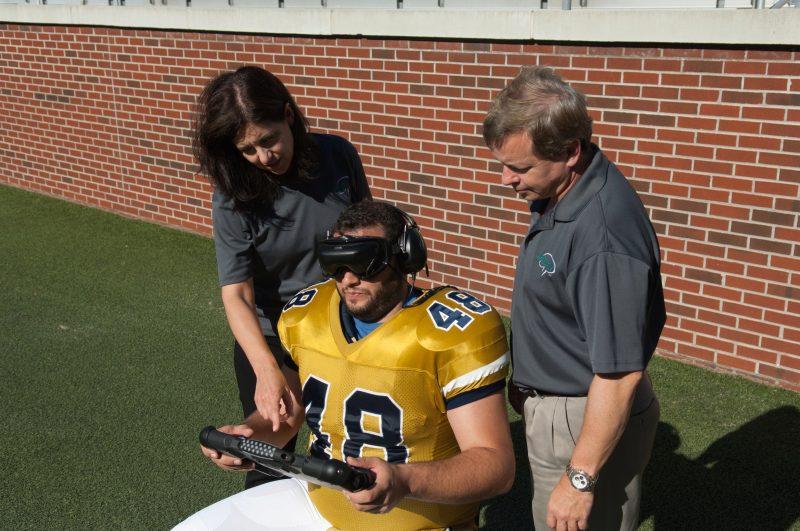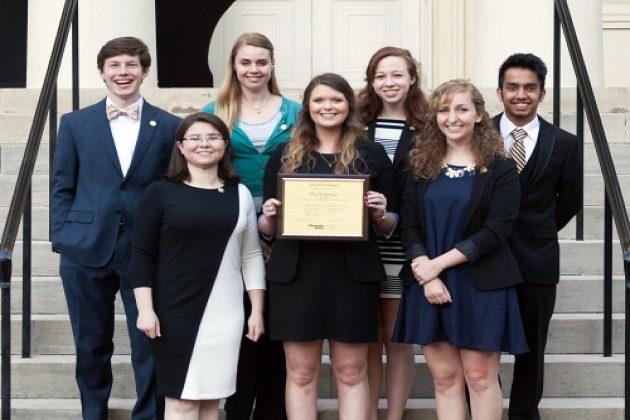The Grand Challenges Scholars Program helps students shape their education around one big idea

As seen in the Spring 2017 issue of the Georgia Tech Engineer's Magazine, available at magazine.coe.gatech.edu.
It will take years to determine just how much the people of Flint, Michigan were harmed from consuming water contaminated with dangerous levels of lead. And with millions of old lead pipes still used in cities across the U.S., what happened in Flint has many people asking, “Just how safe is my water?”
Angelique Johnson is working to answer that very question.
As a Grand Challenges scholar at Georgia Tech, Johnson is part of a team of seven undergraduate students developing an electrical sensor that people could install in their homes to test their water for the presence of lead and other heavy metals.
An affordable at-home sensor is important, Johnson explains, because of what might happen as water travels from a treatment plant to your home faucet. The water may test fine at the plant, but as it flows through the network of piping, it can pick up contaminants. That’s exactly what happened in Flint.
“An electrical sensor that automatically tested for lead in the water could help avoid a crisis like Flint,” says Johnson, a sophomore majoring in biomedical engineering “Researchers say they don’t have enough data about water in the home, so the sensors could aggregate data into a database. Then homeowners could access the data for the area. If there is a problem with the water, people could see it.”
Johnson is one of Georgia Tech’s first participants in the Grand Challenges Scholars Program launched last fall. The program offers undergraduates an opportunity to shape their education around tackling one of the 21st century’s biggest engineering challenges.
The National Academy of Engineering chose the Grand Challenges in 2008 as a framework for promoting innovation and discovery in the 21st century. The 14 challenges include goals like “Make Solar Engineer Economical,” “Engineer Better Medicines,” “Secure Cyberspace” and “Develop Carbon Sequestration Methods.” Johnson’s project falls under the challenge “Provide Access to Clean Water.”
Building on this list of challenges, NAE launched the scholar program to involve college students. The program helps students gain the perspective and skills to solve the grand challenges facing the world today. More than 120 engineering schools across the U.S. have committed to participating in the program — with the aim of graduating thousands of Grand Challenge Scholars over the next decade.
At Georgia Tech, the program is co-directed by the College of Engineering’s Dr. Wendy Newstetter and the School of Electrical and Computer Engineering’s Dr. Joy Harris. Eleven students applied in the first semester, and the program is quickly growing in popularity. “The interest is there,” says Harris. “I think we are going to grow and scale very quickly. And I appreciate the level of resources that Georgia Tech has dedicated very early on.”
Harris says there are no limits to how many students can participate. Georgia Tech has set a goal to enroll between 125 and150 students in the program each year.
Sophomore Elizabeth Kappler, a biomedical engineering major and another Grand Challenges Scholar, is working to “Reverse-Engineer the Brain.” Kappler is particularly interested in improving the methods used to detect concussions in children. She’s pursuing her goal through one of Georgia Tech’s unique Vertically Integrated Project (VIP) teams, a collaborative research effort that brings together undergraduate and graduate students and faculty members across disciplines.
Kappler’s team, Concussion Connect, is led by Dr. Michelle LaPlaca, who partnered with colleagues at Emory University to develop a patented concussion assessment test, DETECT. The test, which won a research award from the NFL, is already being used by sports teams to assess players for concussions right on the sidelines of the game, getting an immediate diagnosis that’s essential for quick response and treatment.
Kappler and her VIP teammates are exploring how to modify DETECT so it could help children. They started by reviewing scholarly literature to gauge how a child’s brain functions differently than an adult’s and are using that data to recommend modifications to the adult version of DETECT.
Kappler’s interest in concussion research is personal: As a senior in high school, she suffered a concussion while playing soccer. At the time, her family lived abroad, and the differences in medical care meant Kappler was not properly diagnosed.
“As a result, I went back to play too soon and actually got a repeat concussion, which worsened the symptoms,” she says. Kappler’s concussion symptoms were typical — dizziness, nausea, headache — but because her original injury wasn’t managed correctly, the symptoms worsened, and she took longer to recover. If she’d been immediately diagnosed with DETECT, that “could have changed the entire situation.”
The experience fueled Kappler’s desire to develop better tools to assess and treat concussions. “Developing the pediatric DETECT system could keep a lot of kids from experiencing long-term effects through proper assessment of brain injuries,” she adds.
Hands-on research is just one hallmark of the Grand Challenges Scholars Program. The National Academy of Engineering outlined four additional “experiences” Grand Challenges Scholars must fulfill: entrepreneurship, service and social action, cross-cultural interaction and interdisciplinary learning. Each experience must relate to the core theme of the Grand Challenge chosen by the student.
But the program is extremely flexible, so requirements can be met in a number of ways. And Georgia Tech’s abundant resources offer students a wealth of options. For example, there are more than 100 ways to fulfill the cross-cultural aspect alone.
Newstetter and Harris help Grand Challenges Scholars capitalize on the opportunities. They mentor students on what kinds of activities are available and help them select options that best support their project’s central theme. “At the beginning, we sit down and map out a pathway with each student that makes it possible for them to assemble an impressive portfolio,” says Newstetter.
For entrepreneurship, Kappler plans to participate in 3-Day Startup, an intense, teamwork-oriented weekend workshop. For service, she hopes to volunteer in a clinic that specializes in traumatic brain injuries. Courses on topics like developmental and cognitive psychology will help Kappler build on her understanding of the brain —and these represent the interdisciplinary learning aspect of the program.
In addition to her work on the lead water sensor, Angelique Johnson is also finding interesting ways to fulfill the program’s requirements. For the service requirement, she plans to join Engineers Without Borders, a Georgia Tech program that performs engineering-based service projects. And if her team can develop a successful prototype of the electronic water sensor, they’d like to participate in the InVenture Prize — and generate support to commercialize and market their invention.
“There are so many options to fulfill this program,” Johnson says. “Since it’s a new program, they’re coming up with new ways to fulfill it every day.” Her team is also exploring their project’s potential close to home. “Since we live in Atlanta, we wanted to focus on the areas we know,” she says. So they tested different water sources from across Atlanta, and toured the Atlanta water treatment plant to learn about how the plant conducts water testing.
What excites Johnson and Kappler about the Grand Challenges Scholars Program is the opportunity to unite their academic and extra-curricular work around a single theme, enhancing the learning experience and strengthening portfolios and resumes.
“It’s is a touchstone for students because it’s a structure, but it’s a highly flexible structure,” Newstetter says. “With the Grand Challenges, you have this focal point. Industry is always looking for people who have a sustained engagement with something. And students see an opportunity to bring together all these things they’re doing, in a way that wouldn’t have been possible otherwise.”
